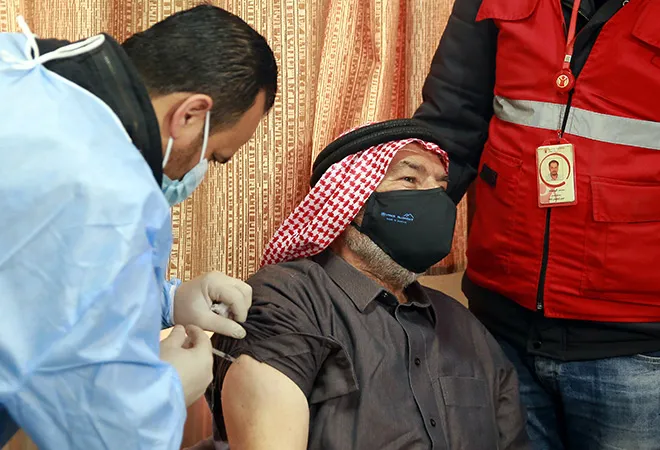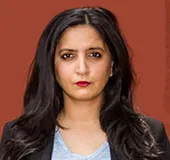-
CENTRES
Progammes & Centres
Location

Syria had the shortest lockdown at the peak of coronavirus infections, unsurprisingly. The country has been reeling under a severe economic crisis, a much bigger concern for Syrians than the pandemic.
The Syrian government was accused of deliberately underreporting the numbers of infections and deaths to hide yet another failure from people. While the military conflict has subsided in Syria the troubles of people have mounted. People in government-held Syria have been grappling with hyperinflation, joblessness, and long power cuts that impacted whatever businesses that survived a decade-long conflict.
Many who allegedly died of the Coronavirus were secretly buried in the Najha cemetery on the outskirts of Damascus. Doctors noted the cause of death of many of those as heart failure or respiratory infections while the families of the deceased reported Coronavirus as the malady.
Syria faced a severe shortage of Personal Protective Equipment or PPE and hospitals simply didn’t have enough respirators to save people. Moreover, many Syrians who opposed the government during the uprising were terrified of going to hospitals or health care centres fearing they may be arrested.
As the vaccines came out, Syria looked to its ally Russia. But Russia took its time. The war-torn country turned out to be among the last to start its vaccination drive.
For months Russia dilly-dallied on Syrian request for doses of Sputnik V- Russia’s coronavirus vaccine. Even though Russia supported Bashar al-Assad’s regime militarily, helped him defeat the rebels, and regain most of the territory, it did not want to donate its vaccine. One dose of Sputnik costs $10 and Russia wanted to sell millions of losses to the war-afflicted Syrian people and make a profit.
Moscow came up with a cunning plan that served its interests and of its allies. It convinced Israel to purchase its vaccine for Syria ostensibly in exchange for a prisoner swap deal. Israeli press reported that one million dollars would be spent on vaccine purchases for Syrians to win over hearts and minds in a traditionally hostile neighboring country.
Some in Israel criticized Netanyahu for using it as an election stunt to appear to be softening ties with Syria, but most saw it as a clever move. Syrians were left befuddled at the news of Israel, an arch-enemy, to be suddenly playing the good Samaritan. Many Syrians observed it as another back-handed secret deal with the Assad government and Tel Aviv.
Syrian government officially denied the reports that Israel purchased the vaccine but it did not reveal who did. Moreover, Damascus did not even tell its people which vaccine it was going to be using, merely qualifying it as a vaccine from a “friendly country.’ Mid-March, Syria finally received 5,000 doses of the said vaccine and started by vaccinating front-line workers in main hospitals. In addition, Syria expects to receive 150,000 doses from China but the timeline of delivery is not yet clear.
Meanwhile, 20% of the Syrian population would be vaccinated under the COVAX initiative led by the World Health Organisation (WHO), the UNICEF, and GAVI Alliance. The idea of COVAX is to help developing countries vaccinate their people at a time even the developed world is quarrelling over vaccine procurement.
Syria will be receiving the Oxford AstraZeneca vaccine manufactured by the Serum Institute India
According to WHO, the first tranche of AZ-SII would be supplied to Syria in the next four weeks and 20% of the population would be covered through COVAX by the end of 2021. There are some concerns that AZ-SII vaccines might not be distributed by the government in the Northeast which is controlled by American allies of the Syrian Democratic Forces or SDF dominated by Kurdish forces.
The WHO, however, vehemently warns against such fears and feels confident about providing the India-manufactured vaccines to the northeast of Syria, too. While UNICEF is responsible to provide vaccines to the country, the Syrian Ministry of Health and the WHO would deliver vaccines to all governorates including northwest and northeast Syria. The vaccine will be administered through fixed facilities and also mobile teams in hard-to-reach areas. The same mechanism that is used to vaccinate children against Polio and other ailments would be activated to vaccinate against the Coronavirus.
Syrians are glad that they are going to receive AZ-SII vaccines through COVAX but they are uncertain when their turn would come. But that is just one of their worries in a very long list.
The views expressed above belong to the author(s). ORF research and analyses now available on Telegram! Click here to access our curated content — blogs, longforms and interviews.

Anchal Vohra was a Fellow at ORF. She writes on contemporary developments in West Asia and on foreign policy.
Read More +